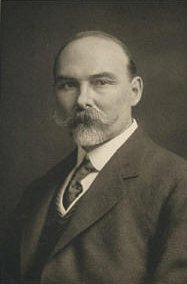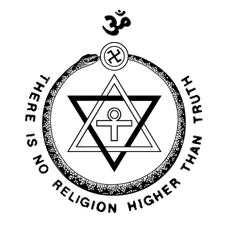G. R. S. Mead

George Robert Stowe Mead (22 September 1863, Nuneaton – 28 September 1933,[1][2] London[3]) was an English author, editor, translator, and an influential member of the Theosophical Society as well as the founder of the Quest Society. His scholarly works dealt mainly with the [[Hermeticism}Hermetic]] and Gnostic religions of antiquity, and were exhaustive for the time period.
Birth and family
George Robert Stowe Mead was born at Nuneaton, Warwickshire, England on the 22nd of March 1863. He was born to Colonel Robert Mead, an Officer in the British Army and to Mary Mead, who had received a traditional education at Rochester Cathedral School.
Education at Cambridge University
Having shown academic potential George Mead began studying mathematics at St John's College, Cambridge.[4] Eventually shifting his education towards the study of Classics he gained much knowledge of both Greek and Latin. In 1884 he completed a bachelor of arts degree, in the same year he also began to practice the position of public school master.
Activity with the Theosophical Society
While still at Cambridge University Mead read Esoteric Buddhism by Alfred Percy Sinnett. This comprehensive theosophical account of the eastern religion prompted Mead to contact two theosophists in London named Bertam Keightly and Mohini Chatterji, which eventually led him to join the Theosophical Society.
Mead became a member of Helena Petrovna Blavatsky's Theosophical Society in 1884. He abandoned his teaching profession in 1889 to be Blavatsky's private secretary and also became a joint-secretary of the Esoteric Section (E.S.) of the Theosophical Society. The E.S. was for those whom the Theosophical Society deemed more advanced.
G.R.S Mead received Blavatsky's six Esoteric Instructions and other teachings at twenty-two meetings headed by Blavatsky which were only attended by the Inner Group of the Theosophical Society. It was because of the intimacy Mead felt with the Inner Group that he married Laura Cooper in 1899.
Contributing intellectually to the Theosophical Society, at first most interested in eastern religions, he quickly became more and more attracted to western esotericism of religion and philosophy, particularly Neoplatonism, Gnosticism and Hermeticism, though his scholarship and publications continued to engage with eastern religion. Making many contributions to the Theosophical Society's Lucifer as joint editor, he eventually became the sole editor of The Theosophical Review in 1907 (as Lucifer was renamed in 1897).
As of February 1909, Mead and some seven-hundred members of the Theosophical Society's British Section resigned in protest at Annie Besant's reinstating of Charles Webster Leadbeater to membership in the society. Leadbeater had been a prominent member of the Theosophical Society until he was accused in 1906 of teaching masturbation to the sons of some American Theosophists under the guise of occult training. While this prompted Mead's resignation, his frustration at the dogmatism of the Theosophical Society may also have been a major contributor to his break with the society. He had been a member for twenty-five years.
The Quest Society
In March 1909 Mead founded the Quest Society, composed of 150 defectors of the Theosophical Society and 100 other new members. Very intentionally this new society was planned to be an undogmatic approach to the comparative study and investigation of religion, philosophy, and science. The Quest Society had lectures at Kensington Town Hall in central London but its most focused effort was in its publishing of The Quest: A Quarterly Review which ran from 1909-1931 with many contributors.
Influence
Among notable names influenced by G.R.S. Mead there can be found: Ezra Pound, W.B. Yeats, Hermann Hesse, Kenneth Rexroth, and Robert Duncan. In her celebrated biography of Jung, Deirdre Bair states that Carl Gustav Jung was also influenced by George Mead, himself owning at least eighteen of Mead's books (Bair, 2003, p. 297), but Sonu Shamdasani, 2005, states otherwise, at p. 100, fn 316.
Works
| Part of a series on |
| Theosophy |
|---|
 |
- Simon Magus (1892)
- Orpheus (1895/6)
- Pistis Sophia (1896, 1921 ed).
- Pistis Sophia at sacred-texts
- Fragments of a Faith Forgotten (1900 1st edition);
- Fragments of a Faith Forgotten at sacred-texts.
- Apollonius of Tyana 1905, at sacred-texts.
- Thrice Greatest Hermes, vol. 1
- Thrice Greatest Hermes, vol. 2
- Thrice Greatest Hermes, vol. 3 (London: Theosophical Publishing Society, 1906) at sacred-texts.
- The Hymns of Hermes
- The Gnosis of the Mind
- Commentary on "Pœmandres"
- Introduction to Pistis Sophia
- 3rd edition 1931 pp.241- 249 Introduction to Marcion
- Gnostic John the Baptizer: Selections from the Mandæan John-Book (1924)
- Did Jesus Live 100 BC?
- Address read at H.P. Blavatsky's cremation
- Concerning H.P.B.
- Doctrine of the Subtle Body in Western Tradition
Footnotes
- ^ 1891 England Census, showing a household including "Constance Wachtmeister Manager of Publishing Office; G.R.S. Mead, Author Journalist; Isabel Oakley, Millener; Helena Blavatsky, Authoress; and others"
- ^ 1901 England Census, showing "George R S Mead, age 38, Editor and author born Battersea, Surrey and his wife Laura M Mead, age 44, no occupation, born Dellie[sic], India"
- ^ Nicholas Goodrick-Clarke, Clare Goodrick-Clarke (eds), G. R. S. Mead and the Gnostic Quest, North Atlantic Books, 2005, p. 32.
- ^ "Mead, George Robert Stow (MT881GR)". A Cambridge Alumni Database. University of Cambridge.
External links
- Extensive on-line collection of the writings of GRS Mead (at the Gnosis Archive)
- Brief bio with poor picture
- Same picture, but much larger and clearer
- Later Picture with no text
- Long biography
